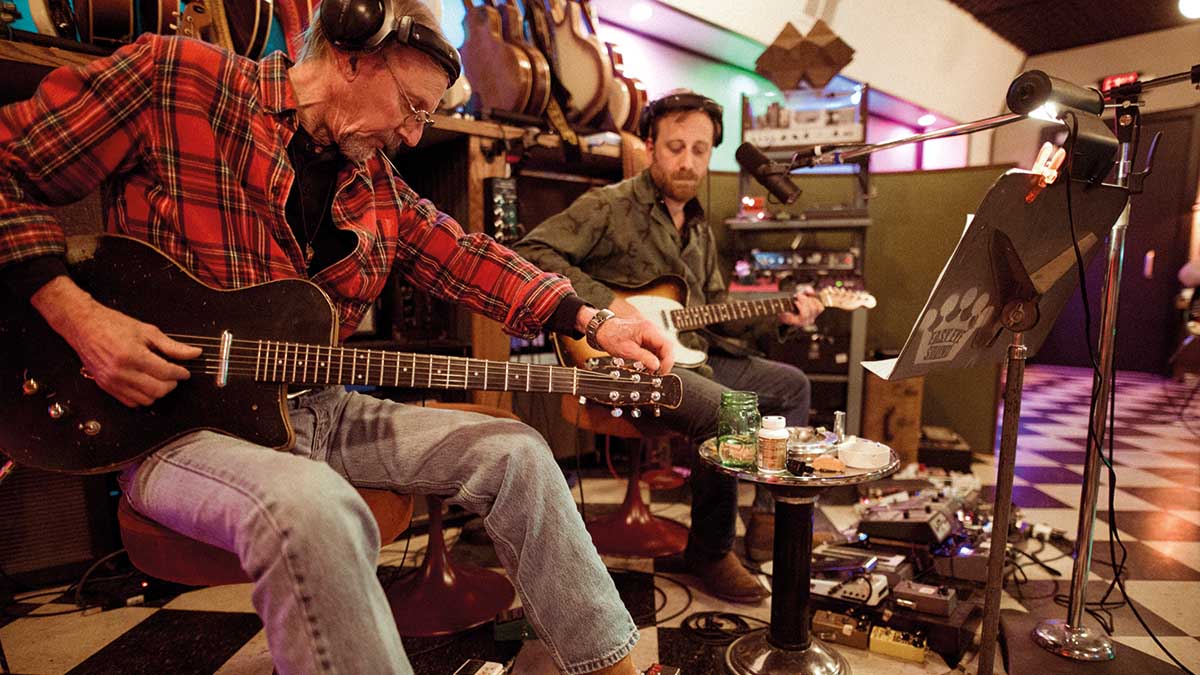Meet Kenny Brown, the greatest of the Hill Country blues sidemen
The 68-year-old guitarist has been there, done that, and is steeped in Mississippi Hill Country blues. This is his story...

If you're going to make an authentic Mississippi Hill Country blues record – as The Black Keys did with the swampy Delta Kream – there are only a handful of people still alive who played with masters like R.L. Burnside and Junior Kimbrough. One of them is 68-year-old guitarist Kenny Brown.
Brown grew up in Nesbit, Mississippi, and learned to play guitar from Mississippi Joe Callicott, who lived next door, when he was 10. He also absorbed the music coming from picnics across the road, where fife-and-drum masters Otha Turner (whose 1998 recording Everybody Hollerin’ Goat is a defining document of the music) and Napoleon Strickland would play with Fred McDowell.
“They would go all week-end sometimes,” Brown says. “I heard that stuff, and then Joe Callicott moved in next door to me and I loved what he was doing. That’s what got me to doing the blues more than any other thing.”
Brown picked up the tunings and techniques of Hill Country blues from Callicott in those early guitar lessons. “Joe first showed me slide in G tuning, which he called Spanish tuning,” he says. “He used a pocket knife, tuned the guitar to Spanish open G and laid it in his lap.” Not long after Callicott passed away, Brown met Bobby Ray Watson, who showed him open E tuning and how to play slide upright with a piece of pipe or glass on his finger.
“I’ve used everything you can think of, from an 11/16 deep-well socket [to] Coricidin bottles when you could get the old glass Coricidin bottles in the '70s,” he says. Until the mid '90s, when he began touring and performing full time, he would have plumbers on the construction jobs he worked cut 3/4-inch copper tubing so it barely hung off the tip of his finger, just how he likes it.
By the time he met R.L. Burnside in the early 1970s, Brown was eager to play the Hill Country blues he had grown up with. The pair began playing at Burnside’s house a few times a week, sometimes until late at night, and later at juke joints like Junior’s Place, owned by Junior Kimbrough.
Brown became a formidable sideman for both bluesmen, appearing on Burnside’s entire 1990s-2000s output, from Too Bad Jim through A Bothered Mind, as well as on Kimbrough’s Sad Days, Lonely Nights and Most Things Haven’t Worked Out (all Fat Possum).
Get The Pick Newsletter
All the latest guitar news, interviews, lessons, reviews, deals and more, direct to your inbox!
While playing as a duo and with people like R.L.’s grandson Cedric Burnside on drums (now a Grammy-nominated blues singer and guitarist), Brown and Burnside worked out a way to complement each other.
“The way we got the sound that we did, both of us were using our thumb and index finger, going up and down,” he says. “And even though we played pretty close to the same licks, I might be sliding while he was picking with his fingers, and vice versa. I tried not to play on top of him, and we just over the years developed a way of playing together.
“The way our hands were going, getting so much harmonics going, there were times where I swear somebody had walked up on stage playing a harmonica, or I could hear a piano play and look around the stage and there wouldn’t be anybody there,” he says.
Brown was also by his side on A Ass Pocket of Whiskey [Fat Possum], Burnside’s 1996 collaboration with the Jon Spencer Blues Explosion, as well as the subsequent world tours that gave them a new audience of college-age fans and sustained them until Burnside passed away in 2005.
In the years since, Brown has collaborated with artists like Jessie Mae Hemphill and the North Mississippi Allstars, fronted by former Black Crowes guitarist Luther Dickinson. He also organizes the North Mississippi Hill Country Picnic, an annual gathering of regional blues artists that carries on the traditions of Kimbrough’s Sunday-evening jams, Otha Turner’s goat barbecues and the picnics Brown attended as a boy in Nesbit.
“Blues and this Hill Country music – you know, they didn’t even call it Hill Country music when I started playing it – but I think it’s more popular now than it’s ever been,” he says. “It’s such real music … I think a lot of people are hungry for this kind of stuff. I feel honored.”
Jim Beaugez has written about music for Rolling Stone, Smithsonian, Guitar World, Guitar Player and many other publications. He created My Life in Five Riffs, a multimedia documentary series for Guitar Player that traces contemporary artists back to their sources of inspiration, and previously spent a decade in the musical instruments industry.
“Even the thought that Clapton might have seen a few seconds of my video feels surreal. But I’m truly honored”: Eric Clapton names Japanese neo-soul guitarist as one to watch
“You better be ready to prove it’s something you can do”: Giacomo Turra got exposed – but real guitar virtuosos are being wrongly accused of fakery, too











